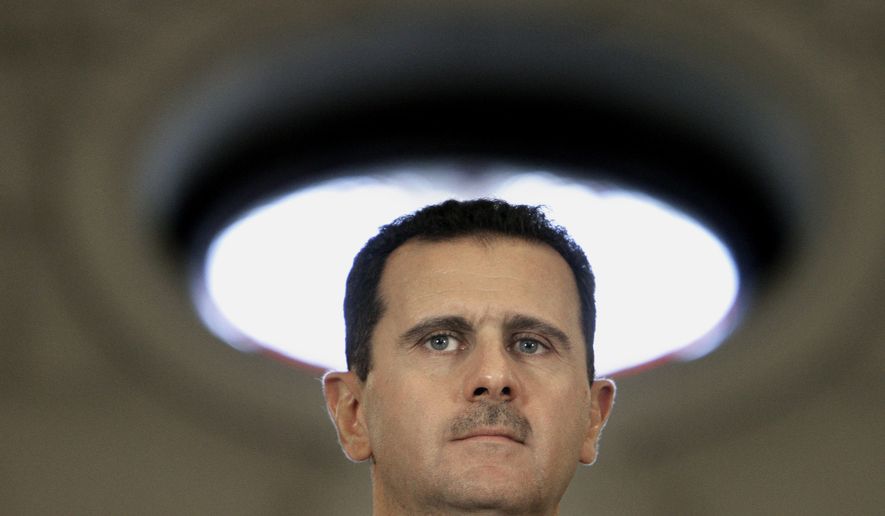The U.S. will make a final push Tuesday in eight-party talks to curb Iran’s nuclear program in exchange for lifting international sanctions, with a new cloud hanging over the negotiations: the possibility of the Obama administration moving more directly to topple Syrian President Bashar Assad, a close ally of Tehran.
The final round of talks in Vienna comes after nearly a year of negotiations has failed to produce an agreement. Officials from the U.S. and its partners — Britain, France, Germany, Russia, China and the European Union — say they’re unlikely to reach a deal with the Iranian regime by the Nov. 24 deadline, and the two sides might settle for another interim agreement that would extend the talks into next spring.
But the new wrinkles in the talks include an incoming GOP majority in the Senate and fresh doubts about Syria, where the Obama administration is training and arming a moderate rebel army to defeat the Islamic State terrorist group. President Obama has asked his national security team for another review of his Syria policy, with administration sources saying the strategy of defeating the Islamic State in Iraq first may have been a miscalculation, and the Free Syrian Army might need help more quickly in its two-front war against the Assad regime and the Islamic State.
If the administration does decide to act more overtly against Mr. Assad, analysts say the move would threaten any deal with Iran to slow its nuclear weapons ambitions.
“The fundamental question under review is whether or not you can beat [the Islamic State] basically by leaving Assad alone,” said Aaron David Miller, a Middle East analyst at the Woodrow Wilson International Center.
“If the judgment is made on the part of the administration that it needs to turn its attention to fundamentally weakening Assad,” he said, it will become “a major obstacle” to Iran’s cooperation in the nuclear talks.”
“We’re going to end up hammering one of their important allies, along with Hezbollah,” Mr. Miller said.
Officials from Iran, a largely Shiite Muslim state, have indicated they’re prepared to help the U.S.-led coalition defeat the Islamic State, a Sunni Muslim extremist group, and have tried to link the offer to the nuclear talks, but Western officials oppose that idea.
A spokesman for the White House National Security Council said last week that the administration’s Syria policy has not changed, saying the “immediate focus” is to drive the Islamic State out of Iraq while the U.S. and coalition partners conduct airstrikes against the fighters in Syria to deny them safe haven.
House Committee on Foreign Affairs Chairman Edward R. Royce, California Republican, told CNN last week that he believes the White House is shifting its strategy, in part because Turkey and other Gulf states are pushing for Mr. Assad’s ouster. Turkey and Jordan, in particular, have been inundated with refugees from Syria’s brutal three-year-old civil war.
In the Iran talks, Tehran insists it has the right to develop a civilian nuclear energy program, but the U.S. and its allies say Iran is using the program to secretly develop the capability to build its own nuclear arsenal. The key sticking points in the talks include how many uranium enrichment centrifuges Iran would be allowed, as well as the speed of lifting international sanctions on oil exports and the banking and insurance sectors, which have badly battered the Iranian economy.
The U.S. and its European allies want the number of centrifuges in operation to be in the low thousands; Iran is holding out for tens of thousands. Tehran now has about 19,000 centrifuges installed and around 10,000 in operation.
Iranian officials are said to be open to a proposal to transfer some of Iran’s enriched uranium to Russia for storage. A senior U.S. official told Reuters last week that most of the technical aspects of an agreement are completed, but the political document remains to be worked out.
Mr. Miller said the signals from the negotiators suggest “that the gaps are too wide for a comprehensive agreement.” Even if a deal is reached, he said, it’s unlikely to satisfy fully either Washington or Tehran.
“It’s not going to be about capitulation,” Mr. Miller said. “It’s not a question of eliminating [Iran’s nuclear program], it’s a question of constraining. And our desire to constrain may well be more than the ’Mullahcracy’ in Tehran is willing to concede.”
The Republican landslide in the midterm election also could play a role in the talks, with Iranians worried that the Obama administration is losing its ability to carry out its commitments in the face of GOP majorities in both the House and the Senate. There is also deep bipartisan support on Capitol Hill for Israel, which has vehemently criticized the emerging nuclear deal.
Two senators responsible for introducing tough sanctions on Iran renewed their warning last week that any final pact must “dismantle” Tehran’s nuclear program.
“We believe that a good deal will dismantle, not just stall, Iran’s illicit nuclear program and prevent Iran from ever becoming a threshold nuclear weapons state,” outgoing Senate Committee on Foreign Relations Chairman Robert Menendez, New Jersey Democrat, and Republican Sen. Mark Kirk of Illinois said in a statement.
They said a potential deal must include a robust inspection and verification program as well as impose strict limits on nuclear research.
Should a potential deal fail to achieve such goals, “we will work with our colleagues in Congress to act decisively, as we have in the past.”
“Gradual sanctions relaxation would only occur if Iran strictly complied with all parts of the agreement,” they said.
After the midterm election, Sen. Lindsey Graham, South Carolina Republican, called for more active Senate engagement on the Iranian sanctions.
“I want a vote on sanctions in case the deal falls apart,” Mr. Graham said. “This is the most important foreign policy issue that any president will decide in generations.”
• Dave Boyer can be reached at dboyer@washingtontimes.com.




Please read our comment policy before commenting.